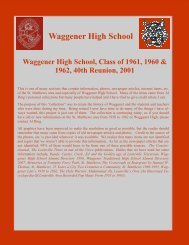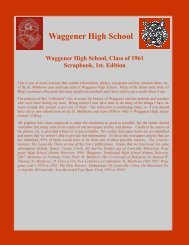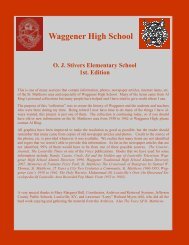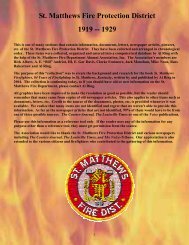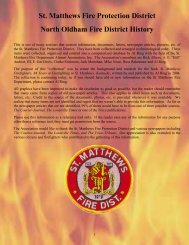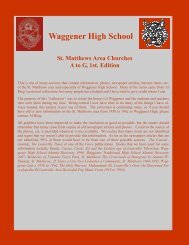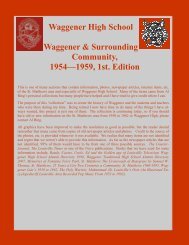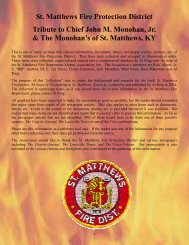Our Era - Movies, Music, Radio and TV, 6th Edition
Our Era - Movies, Music, Radio and TV, 6th Edition
Our Era - Movies, Music, Radio and TV, 6th Edition
You also want an ePaper? Increase the reach of your titles
YUMPU automatically turns print PDFs into web optimized ePapers that Google loves.
<strong>Our</strong> <strong>Era</strong> - <strong>Movies</strong>, <strong>Music</strong>, <strong>Radio</strong> & <strong>TV</strong>, 1950‟s <strong>and</strong> 1960‟s. 1960Courtesy The Monarchs, http://www.themonarchs.com/index.htmlThe MonarchsTheir first professional engagement paid the entire nine-member b<strong>and</strong> $20. Today they comm<strong>and</strong> more than 150 times thatfigure. They thought they had arrived when they bought the red '49 Packard ambulance to carry their equipment. Today ittakes two 5-ton vans. The Monarchs have come a long way. In 1960, the Blue Angels, a 5-piece combo, contained the coreof what would become The Monarchs. Following the addition of four members <strong>and</strong> a name change suggested by FrancesGibson the Mother of Mike Gibson the lead singer, the b<strong>and</strong> scraped together the money to record their first 45.It was an era filled with local "music stars." It was a time of sock hops, teen clubs <strong>and</strong> AM radio. If a group had out a recordit was possible to receive airplay. The Monarchs' first recording, "Over The Mountain;' in 1962 was the first step in establishingwhat has become an unprecedented reign over Louisville's pop music. The top ten success of "Over The Mountain'on the local radio charts, led to a constant dem<strong>and</strong> for The Monarchs at teen dances. The SAMBO Agency (later to becomeTriangle Talent) soon signed these eager young men. Their second single was James Browns "This Old Heart." This danceable,uptempo number backed with, "Till I Hear It From You," a soft romantic song written by Louisvillian CharlesWoodring, introduced the lasting Monarchs' sound. Released on the JAM label, it quickly soared to the top of both WAKY<strong>and</strong> WKLO's charts. By the spring of 1963, The Monarchs had established their name regionally as well as locally.They were regulars at the FOP Hop in Okolona, the Middletown Hop, Gypsy Village at Fountaine Ferry Park, Ewing LaneDance in Jeffersonville, In., <strong>and</strong> the weekly dance on the Belle Of Louisville. The b<strong>and</strong> was booked into a regional circuitthat included college fraternity <strong>and</strong> sorority dances, <strong>and</strong> clubs in Jasper, In. <strong>and</strong> Lebanon, Ky. The Monarchs became a favoritefor debutante balls <strong>and</strong> were in constant dem<strong>and</strong> from Indianapolis to Cincinnati.These nine young men were able to appeal to both young <strong>and</strong> old. Their good looks, accompanied by their smooth treatmentof a love ballad, fulfilled every young girl's dream. At the same time, their clean cut appearance <strong>and</strong> squeaky-clean reputationsatisfied even the strickest parent's image of the "boy next door."In 1964, The Monarchs chose to record a song that would allow them to fully explore the rich harmonies of the four vocalists<strong>and</strong> feature Mike Gibson's falsetto, the trademark for the b<strong>and</strong>. The song was, "Look Homeward Angel;' The recordingsession took place in Owen Bradley's Recording Studio in Nashville, Tennessee <strong>and</strong> it included several other Louisvillemusicians. Innovative for the time, The Monarchs achieved their desired sound by vocal overdubbing <strong>and</strong> the addition ofinstruments commonly used in a full orchestra. This single shot to #1 on the local <strong>and</strong> regional charts <strong>and</strong> caught the attentionof the national music scene. "Look Homeward Angel" remained on the national Billboard charts for thirteen weeks <strong>and</strong>went all the way to #47.The Monarchs had notched a place for themselves in Louisville's music history. The dem<strong>and</strong> for the b<strong>and</strong> became evenmore accelerated <strong>and</strong> they went "on the road."The Monarchs traveled all along the East Coast, playing at every event from teen dances to gr<strong>and</strong> openings for shoppingcenters. They appeared on radio <strong>and</strong> <strong>TV</strong>. shows, such as the Bob Braun Show. Each appearance earned them invaluableexperience <strong>and</strong> won them new fans. The travel was paying off. "Look Homeward Angel" went to #1 in 17 major markets<strong>and</strong> was breaking into the Top 10 throughout the country.The Monarchs appeared in concert with some of the biggest national performers of the time including Del Shannon, Jay <strong>and</strong>the Americans, the Beach Boys <strong>and</strong> Glen Campbell, Bo Diddley, Johnny Tillotson <strong>and</strong> Dee Dee Sharp.The Monarchs' follow-up record, "Climb Every Mountain," did well on the regional level reaching #13 on the charts. But,just as the current sound in music had begun to change with the British invasion, the b<strong>and</strong> members' lives had begun tochange. They were a little older now, other dem<strong>and</strong>s had to take priority <strong>and</strong> their music careers were slowly moved to theback burner. Many American groups gave in to the British influence <strong>and</strong> changed their sound. The Monarchs fought tomaintain their harmonious quartet style but around 1967 members began to leave the b<strong>and</strong> in order to pursue professionalcareers. College <strong>and</strong> the military took some; marriage <strong>and</strong> children dem<strong>and</strong>ed more time be spent at home. For a brief periodother personnel performed using The Monarchs' name but by the late sixties, The Monarchs had faded into the grown-upworld of 9 to 5 jobs <strong>and</strong> mortgage payments.Their time of innocence was over but each member had something that no amount of hum-drum daily living could ever takeaway. They were THE MONARCHS.In 1972 The Monarchs were invited by columnist Billy Reed to re-unite as the subject for a Courier Journal newspaper article.B<strong>and</strong> members saw each other, many for the first time, in years. They introduced wives, showed-off pictures of thekids, laughed <strong>and</strong> reminisced about the "good old days." <strong>Music</strong>al instruments were brought along <strong>and</strong> a few of the old songswere sung. Someone in the crowd jokingly asked, "Just how much would it take to get you all back together again?"The equally lighthearted answer was shouted, "$1,000!" "You're hired!"That may have been the first time that was said in a number of years but it certain it wouldn't be the last. The catch phraseof the day had become, "Where were you in '62?", following the release of American Grafitti. This movie classic hadspawned a nostalgia craze across the country involving everything from our television programming to our music.The Monarchs musical re-entry was for a dance held in Pleasure Ridge Park. Following the newspaper reunion party, theb<strong>and</strong> members spent several days practicing <strong>and</strong> put together an hour's worth of material. The "guest spot" they did was so





